Strategic Analysis: Sasol's Global Business Environment & Expansion
VerifiedAdded on 2023/06/11
|23
|6091
|493
Report
AI Summary
This report provides a comprehensive analysis of the global business environment, focusing on its impact on organizations, using SASOL as a case study. It explores various factors such as globalization, PESTLE analysis, driving forces, and the influence of digital technology. The report also examines the influence of the global market on an organization's culture, function, and structure, evaluating how SASOL has adapted to operating in a global context. It discusses Hofstede's dimensions of culture, ethical and sustainable factors, strategic decision-making concerning risk and diversification, and the range of strategic global expansion routes available to the organization. The analysis also considers the challenges and opportunities presented by globalization, including increased competition, tariffs, payroll issues, and technological advancements. Ultimately, the report aims to provide insights into navigating the complexities of the global business environment and achieving sustainable competitive advantage. Desklib offers a variety of resources, including past papers and solved assignments, to aid students in their studies.
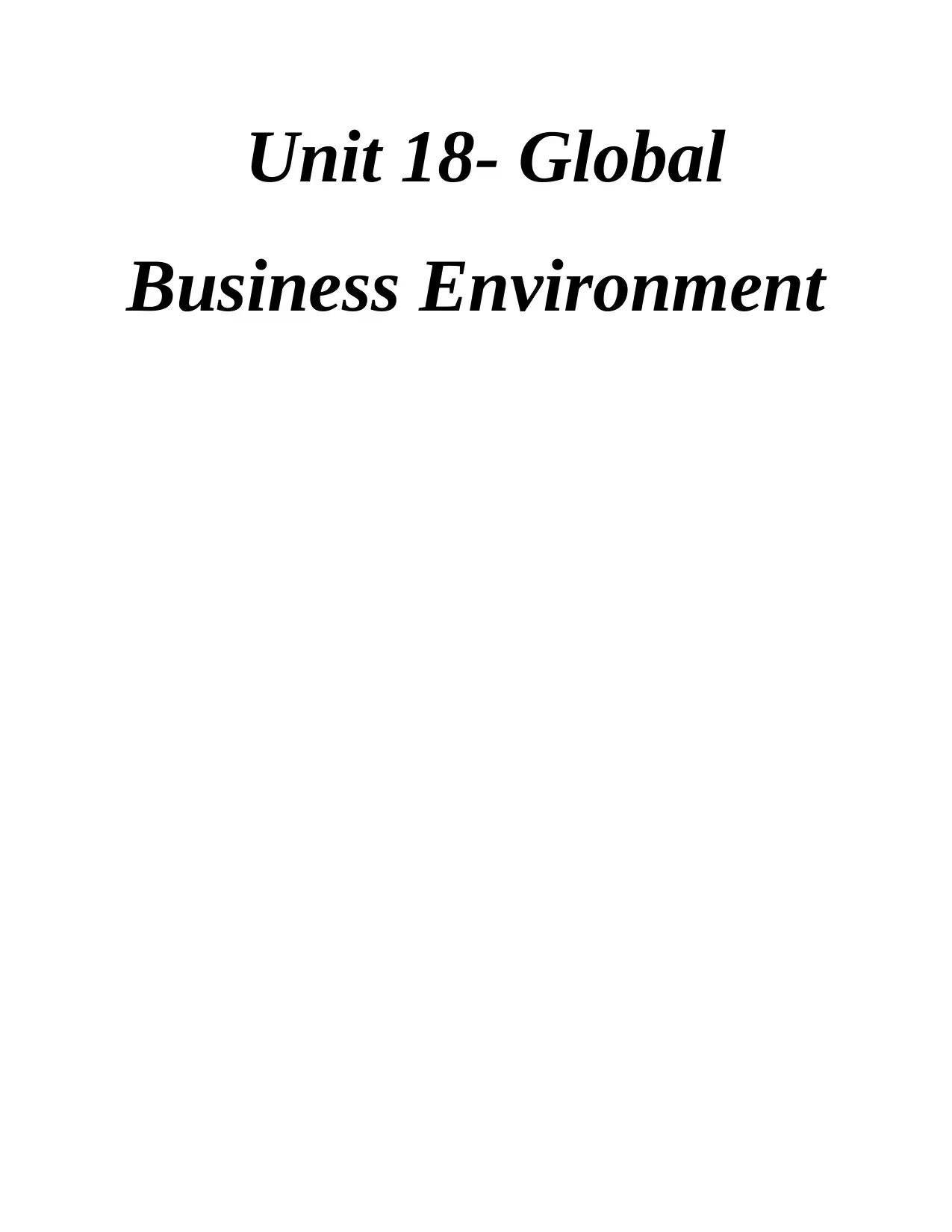
Unit 18- Global
Business Environment
Business Environment
Paraphrase This Document
Need a fresh take? Get an instant paraphrase of this document with our AI Paraphraser
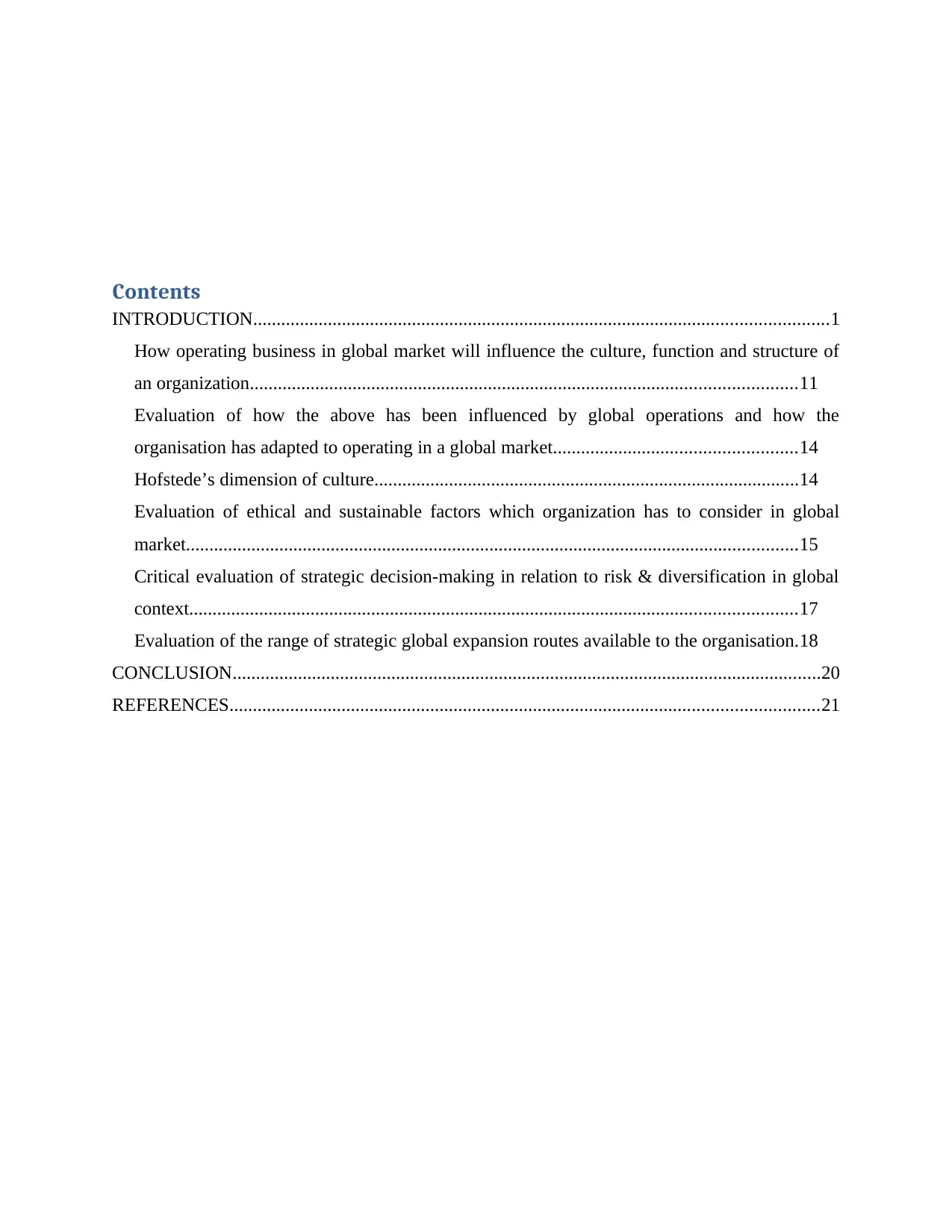
Contents
INTRODUCTION...........................................................................................................................1
How operating business in global market will influence the culture, function and structure of
an organization.....................................................................................................................11
Evaluation of how the above has been influenced by global operations and how the
organisation has adapted to operating in a global market....................................................14
Hofstede’s dimension of culture...........................................................................................14
Evaluation of ethical and sustainable factors which organization has to consider in global
market...................................................................................................................................15
Critical evaluation of strategic decision-making in relation to risk & diversification in global
context..................................................................................................................................17
Evaluation of the range of strategic global expansion routes available to the organisation.18
CONCLUSION..............................................................................................................................20
REFERENCES..............................................................................................................................21
INTRODUCTION...........................................................................................................................1
How operating business in global market will influence the culture, function and structure of
an organization.....................................................................................................................11
Evaluation of how the above has been influenced by global operations and how the
organisation has adapted to operating in a global market....................................................14
Hofstede’s dimension of culture...........................................................................................14
Evaluation of ethical and sustainable factors which organization has to consider in global
market...................................................................................................................................15
Critical evaluation of strategic decision-making in relation to risk & diversification in global
context..................................................................................................................................17
Evaluation of the range of strategic global expansion routes available to the organisation.18
CONCLUSION..............................................................................................................................20
REFERENCES..............................................................................................................................21
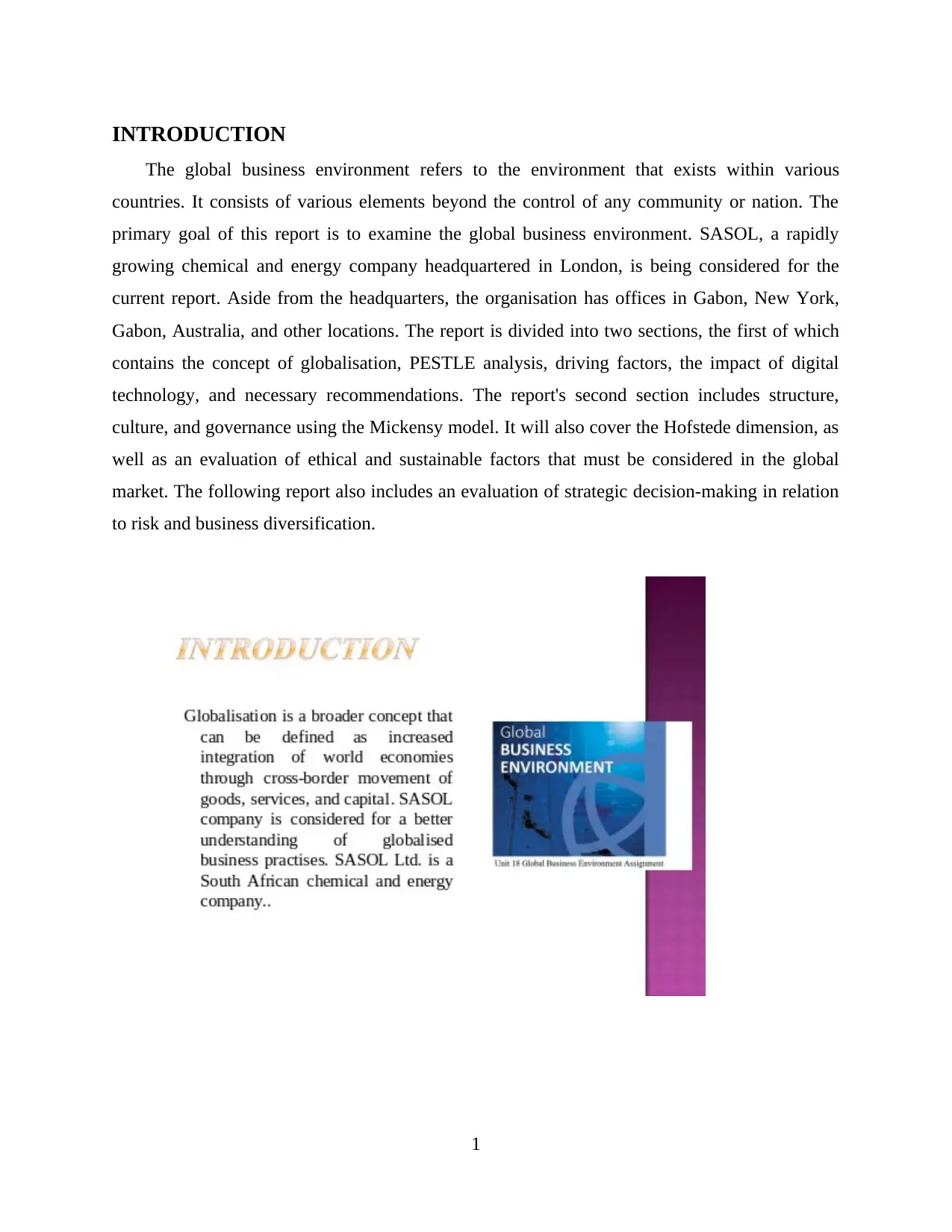
INTRODUCTION
The global business environment refers to the environment that exists within various
countries. It consists of various elements beyond the control of any community or nation. The
primary goal of this report is to examine the global business environment. SASOL, a rapidly
growing chemical and energy company headquartered in London, is being considered for the
current report. Aside from the headquarters, the organisation has offices in Gabon, New York,
Gabon, Australia, and other locations. The report is divided into two sections, the first of which
contains the concept of globalisation, PESTLE analysis, driving factors, the impact of digital
technology, and necessary recommendations. The report's second section includes structure,
culture, and governance using the Mickensy model. It will also cover the Hofstede dimension, as
well as an evaluation of ethical and sustainable factors that must be considered in the global
market. The following report also includes an evaluation of strategic decision-making in relation
to risk and business diversification.
1
The global business environment refers to the environment that exists within various
countries. It consists of various elements beyond the control of any community or nation. The
primary goal of this report is to examine the global business environment. SASOL, a rapidly
growing chemical and energy company headquartered in London, is being considered for the
current report. Aside from the headquarters, the organisation has offices in Gabon, New York,
Gabon, Australia, and other locations. The report is divided into two sections, the first of which
contains the concept of globalisation, PESTLE analysis, driving factors, the impact of digital
technology, and necessary recommendations. The report's second section includes structure,
culture, and governance using the Mickensy model. It will also cover the Hofstede dimension, as
well as an evaluation of ethical and sustainable factors that must be considered in the global
market. The following report also includes an evaluation of strategic decision-making in relation
to risk and business diversification.
1
⊘ This is a preview!⊘
Do you want full access?
Subscribe today to unlock all pages.

Trusted by 1+ million students worldwide
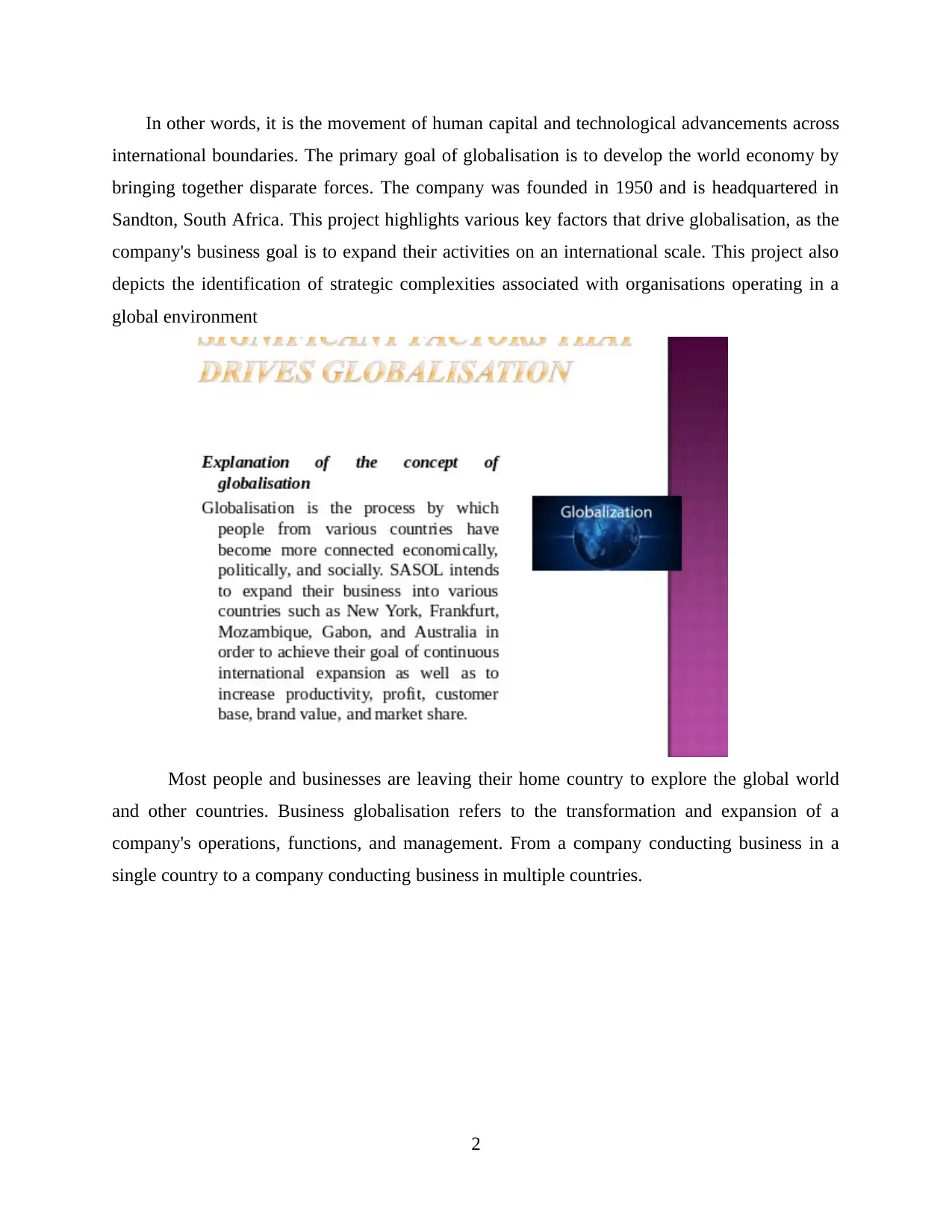
In other words, it is the movement of human capital and technological advancements across
international boundaries. The primary goal of globalisation is to develop the world economy by
bringing together disparate forces. The company was founded in 1950 and is headquartered in
Sandton, South Africa. This project highlights various key factors that drive globalisation, as the
company's business goal is to expand their activities on an international scale. This project also
depicts the identification of strategic complexities associated with organisations operating in a
global environment
Most people and businesses are leaving their home country to explore the global world
and other countries. Business globalisation refers to the transformation and expansion of a
company's operations, functions, and management. From a company conducting business in a
single country to a company conducting business in multiple countries.
2
international boundaries. The primary goal of globalisation is to develop the world economy by
bringing together disparate forces. The company was founded in 1950 and is headquartered in
Sandton, South Africa. This project highlights various key factors that drive globalisation, as the
company's business goal is to expand their activities on an international scale. This project also
depicts the identification of strategic complexities associated with organisations operating in a
global environment
Most people and businesses are leaving their home country to explore the global world
and other countries. Business globalisation refers to the transformation and expansion of a
company's operations, functions, and management. From a company conducting business in a
single country to a company conducting business in multiple countries.
2
Paraphrase This Document
Need a fresh take? Get an instant paraphrase of this document with our AI Paraphraser
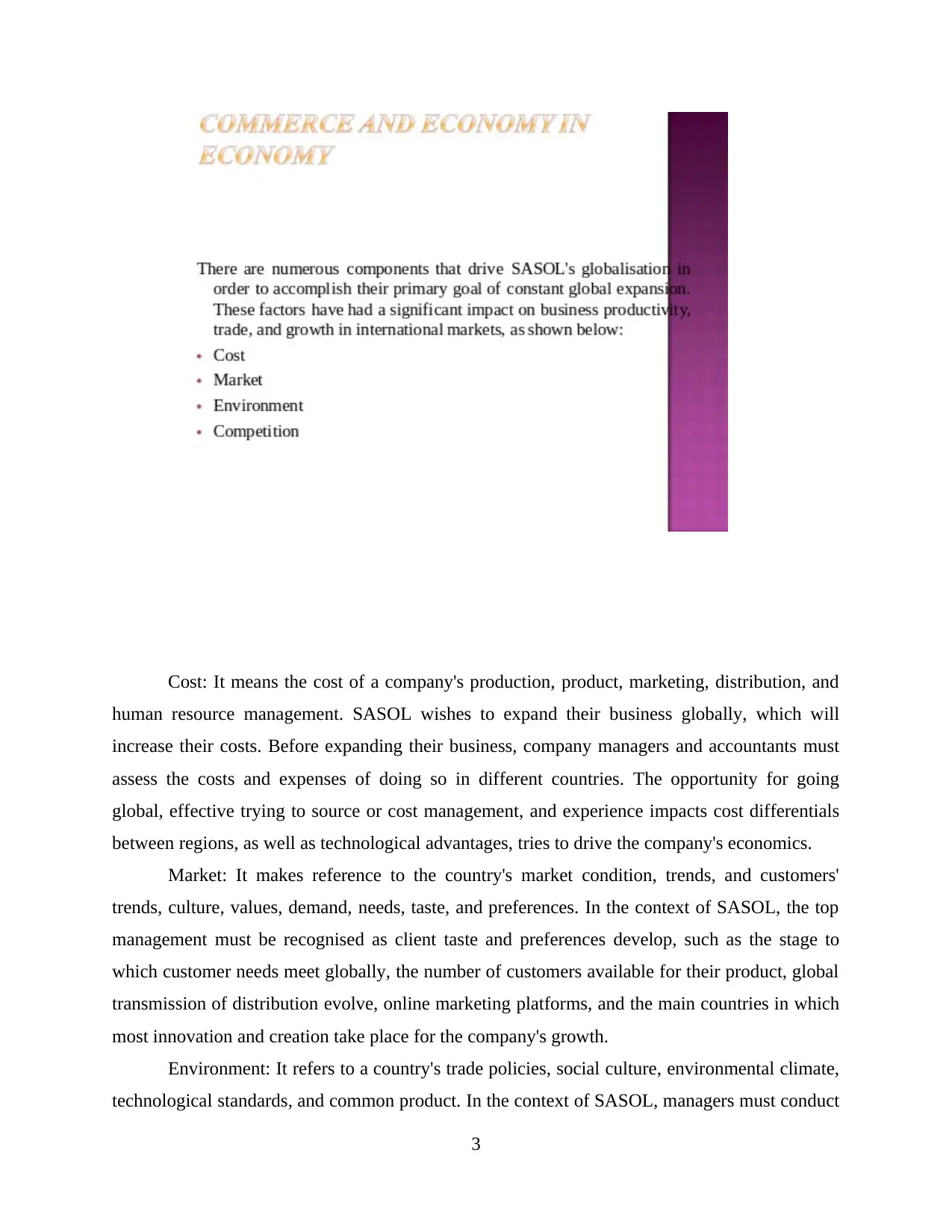
Cost: It means the cost of a company's production, product, marketing, distribution, and
human resource management. SASOL wishes to expand their business globally, which will
increase their costs. Before expanding their business, company managers and accountants must
assess the costs and expenses of doing so in different countries. The opportunity for going
global, effective trying to source or cost management, and experience impacts cost differentials
between regions, as well as technological advantages, tries to drive the company's economics.
Market: It makes reference to the country's market condition, trends, and customers'
trends, culture, values, demand, needs, taste, and preferences. In the context of SASOL, the top
management must be recognised as client taste and preferences develop, such as the stage to
which customer needs meet globally, the number of customers available for their product, global
transmission of distribution evolve, online marketing platforms, and the main countries in which
most innovation and creation take place for the company's growth.
Environment: It refers to a country's trade policies, social culture, environmental climate,
technological standards, and common product. In the context of SASOL, managers must conduct
3
human resource management. SASOL wishes to expand their business globally, which will
increase their costs. Before expanding their business, company managers and accountants must
assess the costs and expenses of doing so in different countries. The opportunity for going
global, effective trying to source or cost management, and experience impacts cost differentials
between regions, as well as technological advantages, tries to drive the company's economics.
Market: It makes reference to the country's market condition, trends, and customers'
trends, culture, values, demand, needs, taste, and preferences. In the context of SASOL, the top
management must be recognised as client taste and preferences develop, such as the stage to
which customer needs meet globally, the number of customers available for their product, global
transmission of distribution evolve, online marketing platforms, and the main countries in which
most innovation and creation take place for the company's growth.
Environment: It refers to a country's trade policies, social culture, environmental climate,
technological standards, and common product. In the context of SASOL, managers must conduct
3
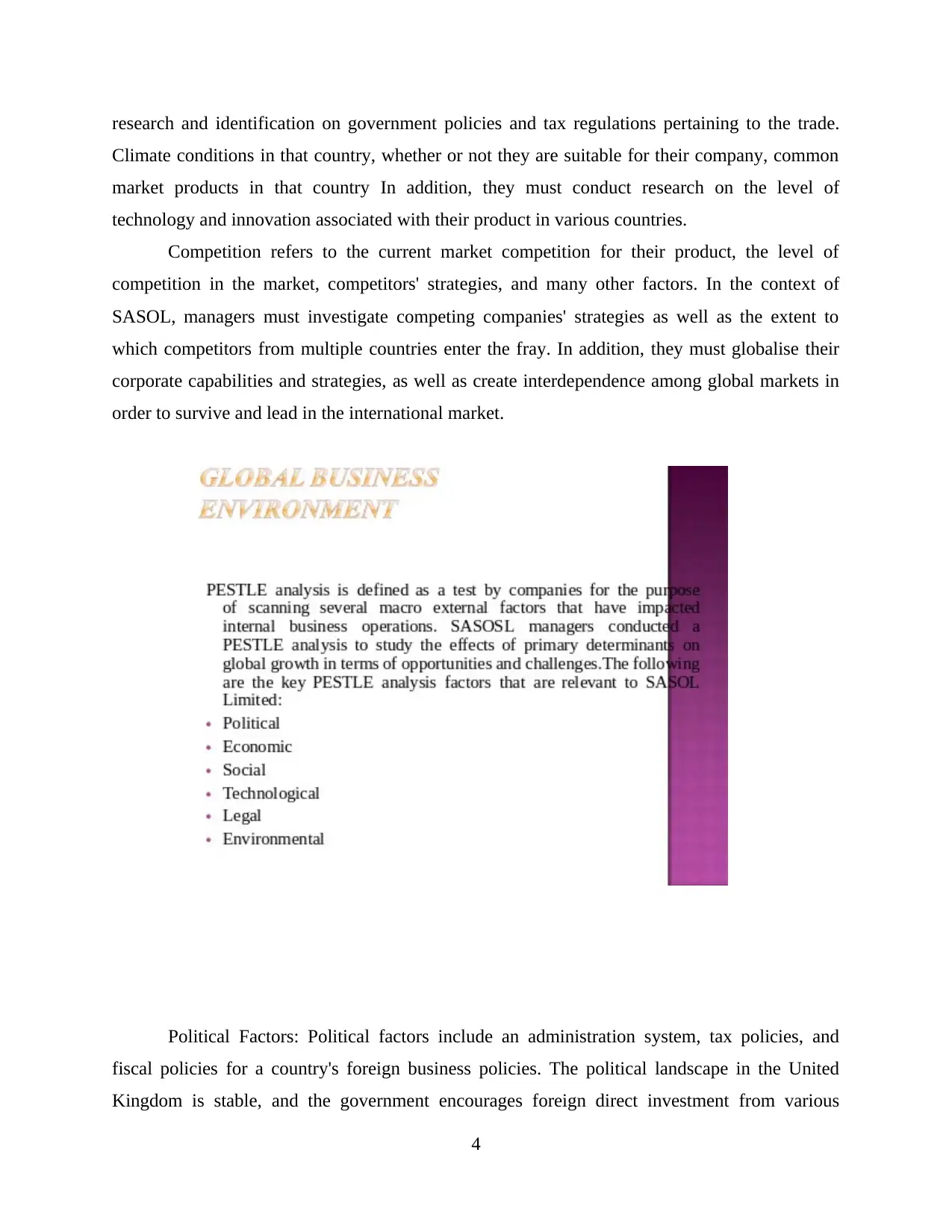
research and identification on government policies and tax regulations pertaining to the trade.
Climate conditions in that country, whether or not they are suitable for their company, common
market products in that country In addition, they must conduct research on the level of
technology and innovation associated with their product in various countries.
Competition refers to the current market competition for their product, the level of
competition in the market, competitors' strategies, and many other factors. In the context of
SASOL, managers must investigate competing companies' strategies as well as the extent to
which competitors from multiple countries enter the fray. In addition, they must globalise their
corporate capabilities and strategies, as well as create interdependence among global markets in
order to survive and lead in the international market.
Political Factors: Political factors include an administration system, tax policies, and
fiscal policies for a country's foreign business policies. The political landscape in the United
Kingdom is stable, and the government encourages foreign direct investment from various
4
Climate conditions in that country, whether or not they are suitable for their company, common
market products in that country In addition, they must conduct research on the level of
technology and innovation associated with their product in various countries.
Competition refers to the current market competition for their product, the level of
competition in the market, competitors' strategies, and many other factors. In the context of
SASOL, managers must investigate competing companies' strategies as well as the extent to
which competitors from multiple countries enter the fray. In addition, they must globalise their
corporate capabilities and strategies, as well as create interdependence among global markets in
order to survive and lead in the international market.
Political Factors: Political factors include an administration system, tax policies, and
fiscal policies for a country's foreign business policies. The political landscape in the United
Kingdom is stable, and the government encourages foreign direct investment from various
4
⊘ This is a preview!⊘
Do you want full access?
Subscribe today to unlock all pages.

Trusted by 1+ million students worldwide
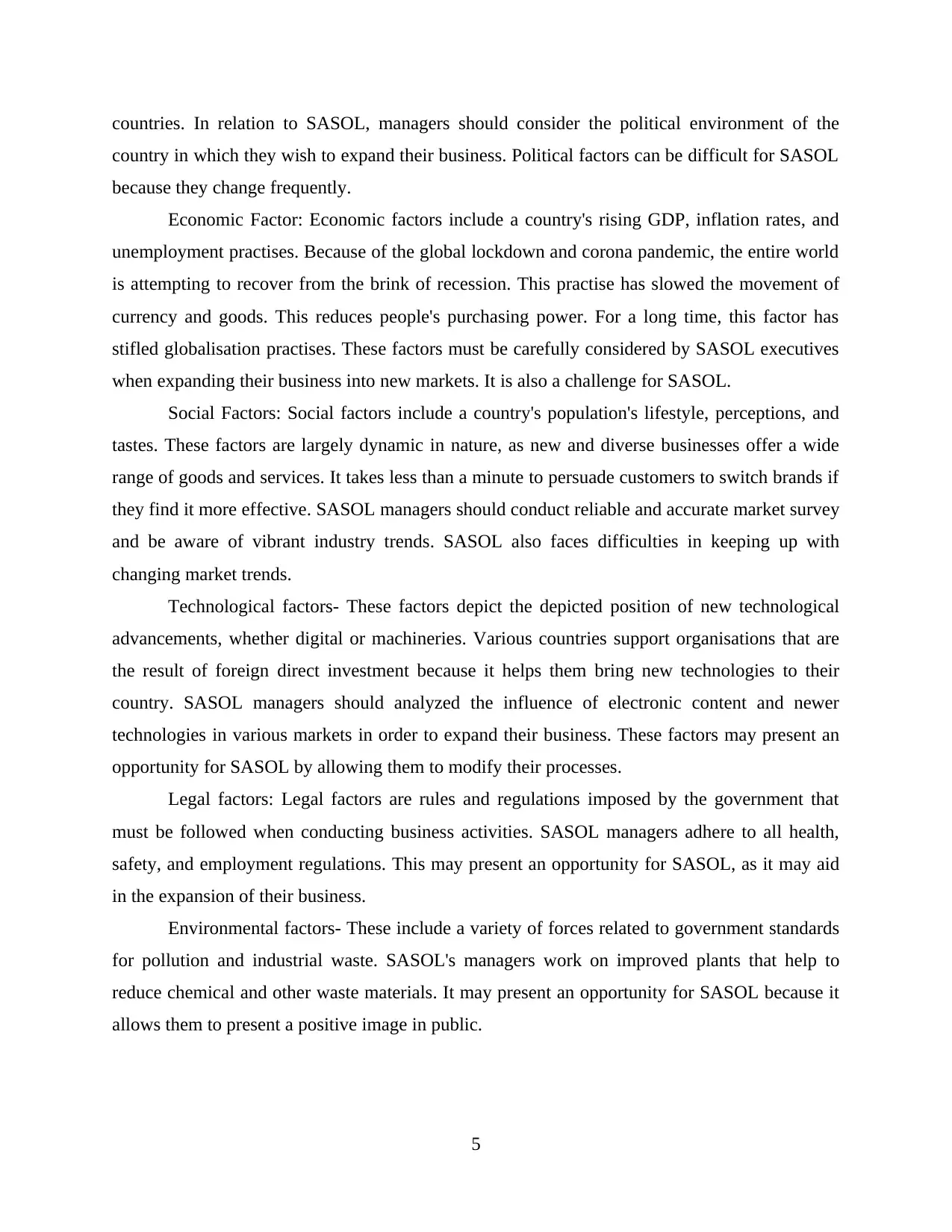
countries. In relation to SASOL, managers should consider the political environment of the
country in which they wish to expand their business. Political factors can be difficult for SASOL
because they change frequently.
Economic Factor: Economic factors include a country's rising GDP, inflation rates, and
unemployment practises. Because of the global lockdown and corona pandemic, the entire world
is attempting to recover from the brink of recession. This practise has slowed the movement of
currency and goods. This reduces people's purchasing power. For a long time, this factor has
stifled globalisation practises. These factors must be carefully considered by SASOL executives
when expanding their business into new markets. It is also a challenge for SASOL.
Social Factors: Social factors include a country's population's lifestyle, perceptions, and
tastes. These factors are largely dynamic in nature, as new and diverse businesses offer a wide
range of goods and services. It takes less than a minute to persuade customers to switch brands if
they find it more effective. SASOL managers should conduct reliable and accurate market survey
and be aware of vibrant industry trends. SASOL also faces difficulties in keeping up with
changing market trends.
Technological factors- These factors depict the depicted position of new technological
advancements, whether digital or machineries. Various countries support organisations that are
the result of foreign direct investment because it helps them bring new technologies to their
country. SASOL managers should analyzed the influence of electronic content and newer
technologies in various markets in order to expand their business. These factors may present an
opportunity for SASOL by allowing them to modify their processes.
Legal factors: Legal factors are rules and regulations imposed by the government that
must be followed when conducting business activities. SASOL managers adhere to all health,
safety, and employment regulations. This may present an opportunity for SASOL, as it may aid
in the expansion of their business.
Environmental factors- These include a variety of forces related to government standards
for pollution and industrial waste. SASOL's managers work on improved plants that help to
reduce chemical and other waste materials. It may present an opportunity for SASOL because it
allows them to present a positive image in public.
5
country in which they wish to expand their business. Political factors can be difficult for SASOL
because they change frequently.
Economic Factor: Economic factors include a country's rising GDP, inflation rates, and
unemployment practises. Because of the global lockdown and corona pandemic, the entire world
is attempting to recover from the brink of recession. This practise has slowed the movement of
currency and goods. This reduces people's purchasing power. For a long time, this factor has
stifled globalisation practises. These factors must be carefully considered by SASOL executives
when expanding their business into new markets. It is also a challenge for SASOL.
Social Factors: Social factors include a country's population's lifestyle, perceptions, and
tastes. These factors are largely dynamic in nature, as new and diverse businesses offer a wide
range of goods and services. It takes less than a minute to persuade customers to switch brands if
they find it more effective. SASOL managers should conduct reliable and accurate market survey
and be aware of vibrant industry trends. SASOL also faces difficulties in keeping up with
changing market trends.
Technological factors- These factors depict the depicted position of new technological
advancements, whether digital or machineries. Various countries support organisations that are
the result of foreign direct investment because it helps them bring new technologies to their
country. SASOL managers should analyzed the influence of electronic content and newer
technologies in various markets in order to expand their business. These factors may present an
opportunity for SASOL by allowing them to modify their processes.
Legal factors: Legal factors are rules and regulations imposed by the government that
must be followed when conducting business activities. SASOL managers adhere to all health,
safety, and employment regulations. This may present an opportunity for SASOL, as it may aid
in the expansion of their business.
Environmental factors- These include a variety of forces related to government standards
for pollution and industrial waste. SASOL's managers work on improved plants that help to
reduce chemical and other waste materials. It may present an opportunity for SASOL because it
allows them to present a positive image in public.
5
Paraphrase This Document
Need a fresh take? Get an instant paraphrase of this document with our AI Paraphraser
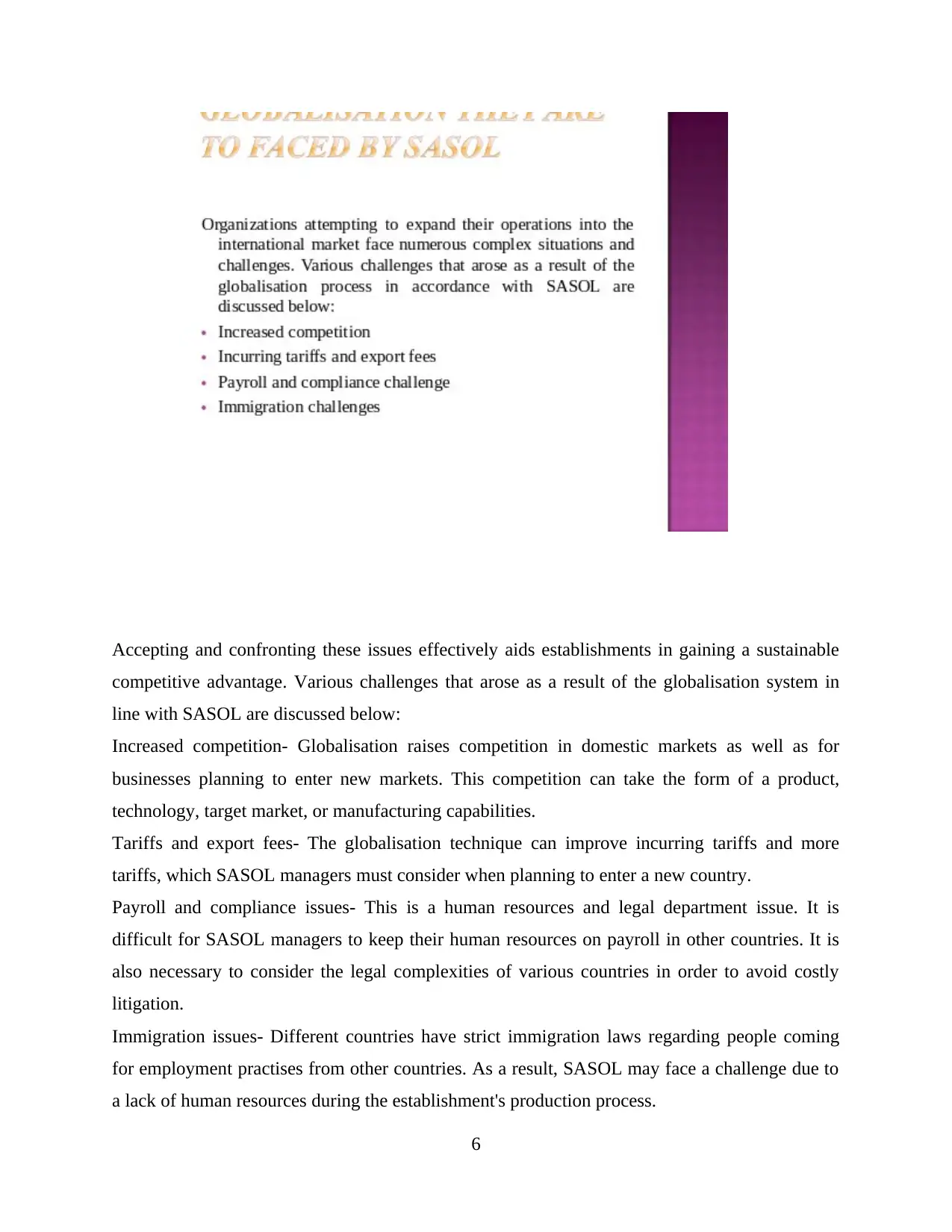
Accepting and confronting these issues effectively aids establishments in gaining a sustainable
competitive advantage. Various challenges that arose as a result of the globalisation system in
line with SASOL are discussed below:
Increased competition- Globalisation raises competition in domestic markets as well as for
businesses planning to enter new markets. This competition can take the form of a product,
technology, target market, or manufacturing capabilities.
Tariffs and export fees- The globalisation technique can improve incurring tariffs and more
tariffs, which SASOL managers must consider when planning to enter a new country.
Payroll and compliance issues- This is a human resources and legal department issue. It is
difficult for SASOL managers to keep their human resources on payroll in other countries. It is
also necessary to consider the legal complexities of various countries in order to avoid costly
litigation.
Immigration issues- Different countries have strict immigration laws regarding people coming
for employment practises from other countries. As a result, SASOL may face a challenge due to
a lack of human resources during the establishment's production process.
6
competitive advantage. Various challenges that arose as a result of the globalisation system in
line with SASOL are discussed below:
Increased competition- Globalisation raises competition in domestic markets as well as for
businesses planning to enter new markets. This competition can take the form of a product,
technology, target market, or manufacturing capabilities.
Tariffs and export fees- The globalisation technique can improve incurring tariffs and more
tariffs, which SASOL managers must consider when planning to enter a new country.
Payroll and compliance issues- This is a human resources and legal department issue. It is
difficult for SASOL managers to keep their human resources on payroll in other countries. It is
also necessary to consider the legal complexities of various countries in order to avoid costly
litigation.
Immigration issues- Different countries have strict immigration laws regarding people coming
for employment practises from other countries. As a result, SASOL may face a challenge due to
a lack of human resources during the establishment's production process.
6
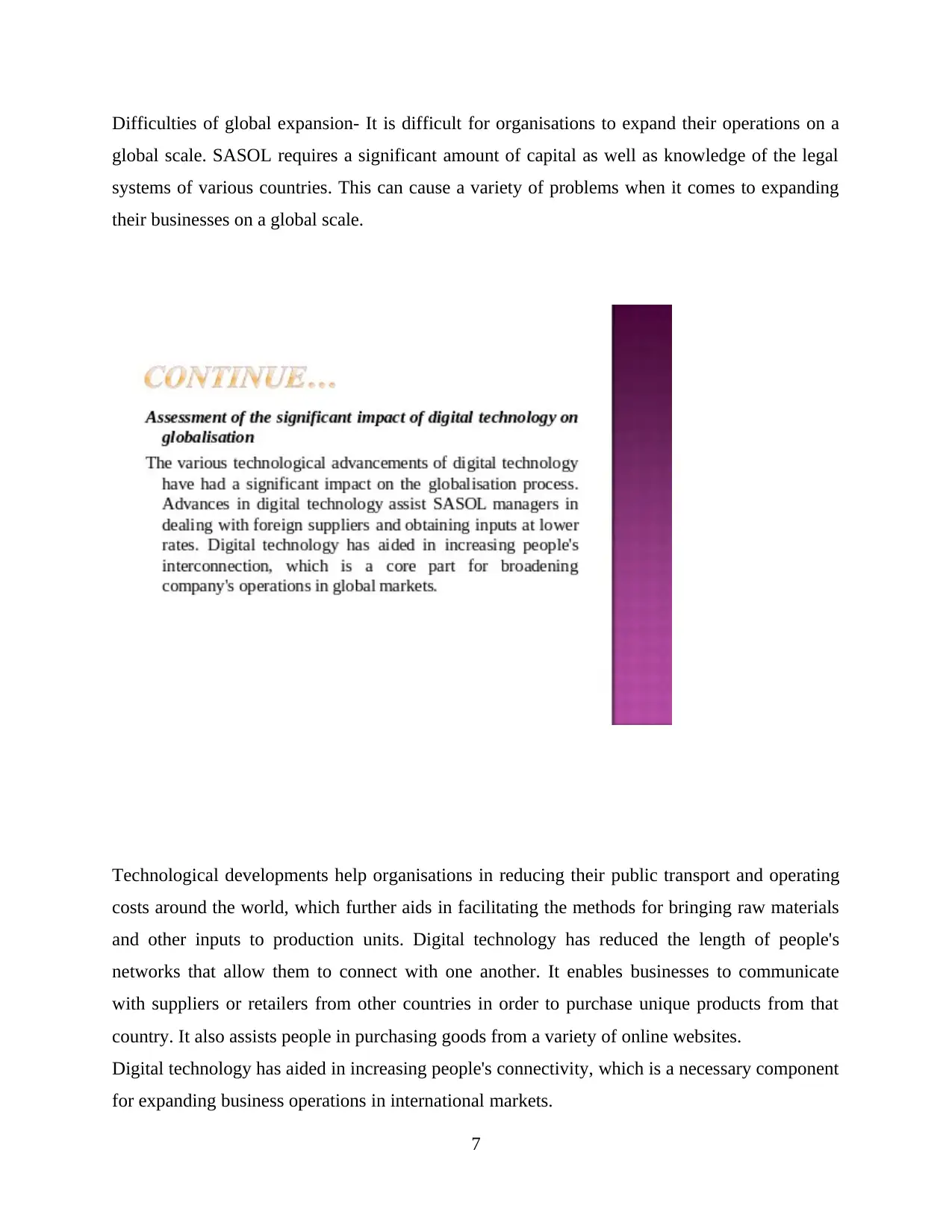
Difficulties of global expansion- It is difficult for organisations to expand their operations on a
global scale. SASOL requires a significant amount of capital as well as knowledge of the legal
systems of various countries. This can cause a variety of problems when it comes to expanding
their businesses on a global scale.
Technological developments help organisations in reducing their public transport and operating
costs around the world, which further aids in facilitating the methods for bringing raw materials
and other inputs to production units. Digital technology has reduced the length of people's
networks that allow them to connect with one another. It enables businesses to communicate
with suppliers or retailers from other countries in order to purchase unique products from that
country. It also assists people in purchasing goods from a variety of online websites.
Digital technology has aided in increasing people's connectivity, which is a necessary component
for expanding business operations in international markets.
7
global scale. SASOL requires a significant amount of capital as well as knowledge of the legal
systems of various countries. This can cause a variety of problems when it comes to expanding
their businesses on a global scale.
Technological developments help organisations in reducing their public transport and operating
costs around the world, which further aids in facilitating the methods for bringing raw materials
and other inputs to production units. Digital technology has reduced the length of people's
networks that allow them to connect with one another. It enables businesses to communicate
with suppliers or retailers from other countries in order to purchase unique products from that
country. It also assists people in purchasing goods from a variety of online websites.
Digital technology has aided in increasing people's connectivity, which is a necessary component
for expanding business operations in international markets.
7
⊘ This is a preview!⊘
Do you want full access?
Subscribe today to unlock all pages.

Trusted by 1+ million students worldwide
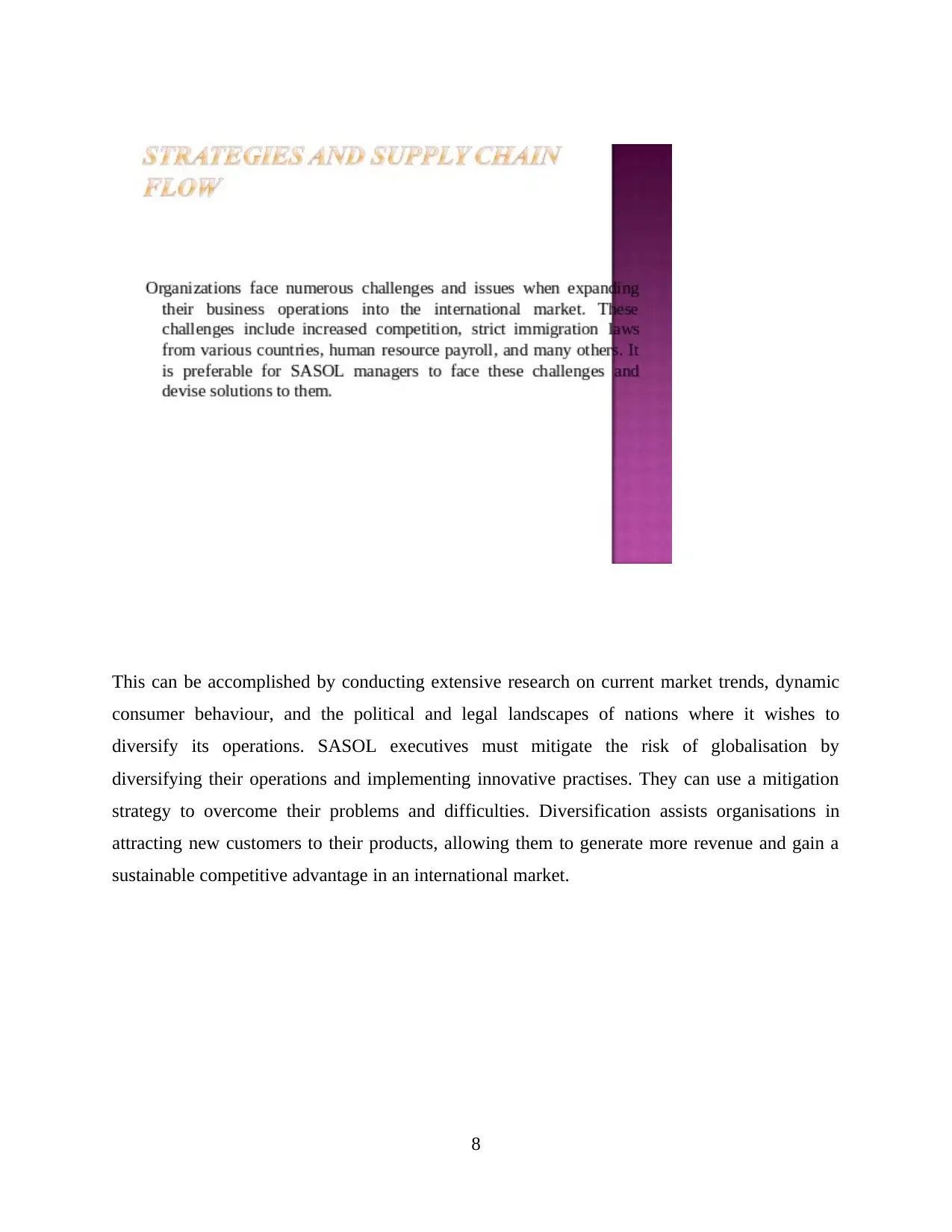
This can be accomplished by conducting extensive research on current market trends, dynamic
consumer behaviour, and the political and legal landscapes of nations where it wishes to
diversify its operations. SASOL executives must mitigate the risk of globalisation by
diversifying their operations and implementing innovative practises. They can use a mitigation
strategy to overcome their problems and difficulties. Diversification assists organisations in
attracting new customers to their products, allowing them to generate more revenue and gain a
sustainable competitive advantage in an international market.
8
consumer behaviour, and the political and legal landscapes of nations where it wishes to
diversify its operations. SASOL executives must mitigate the risk of globalisation by
diversifying their operations and implementing innovative practises. They can use a mitigation
strategy to overcome their problems and difficulties. Diversification assists organisations in
attracting new customers to their products, allowing them to generate more revenue and gain a
sustainable competitive advantage in an international market.
8
Paraphrase This Document
Need a fresh take? Get an instant paraphrase of this document with our AI Paraphraser
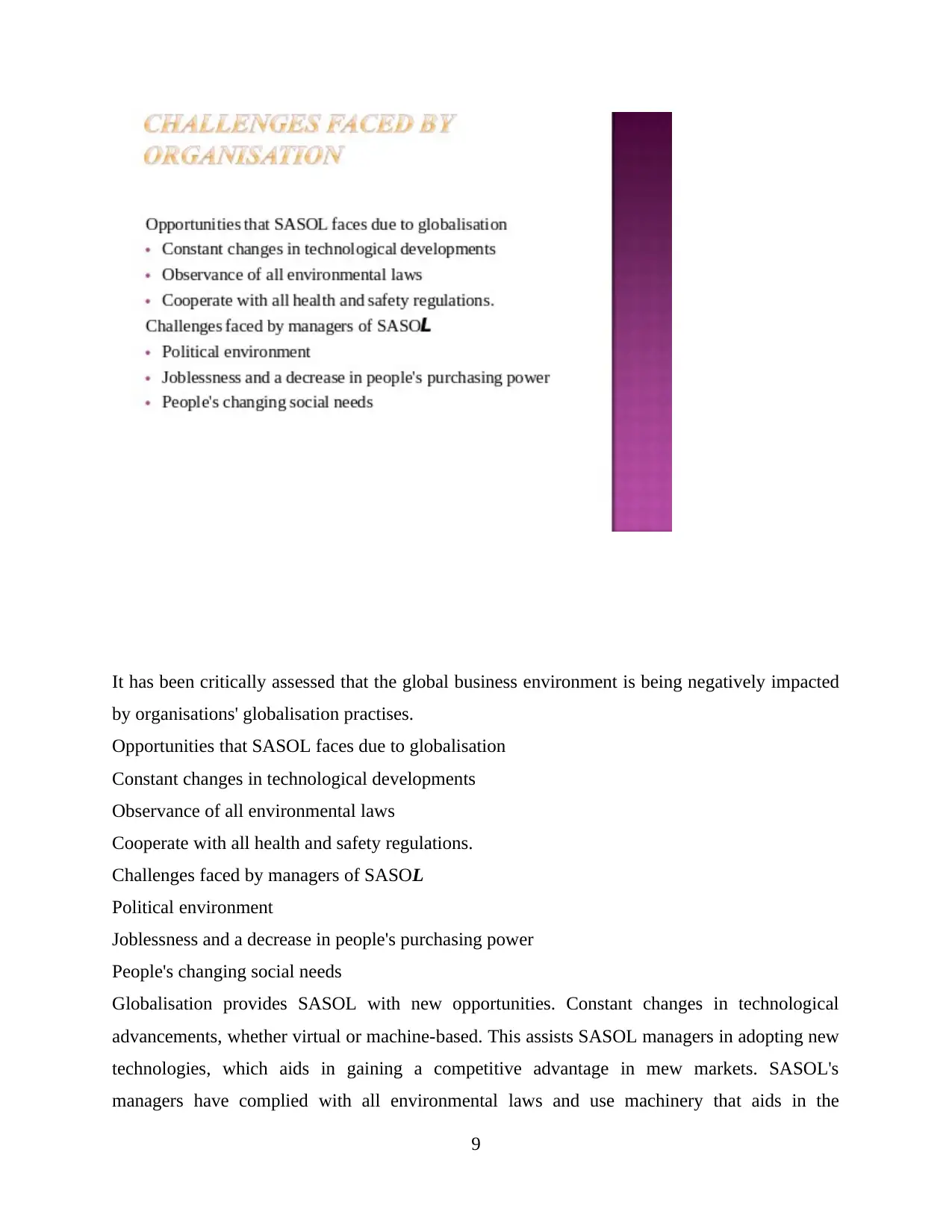
It has been critically assessed that the global business environment is being negatively impacted
by organisations' globalisation practises.
Opportunities that SASOL faces due to globalisation
Constant changes in technological developments
Observance of all environmental laws
Cooperate with all health and safety regulations.
Challenges faced by managers of SASOL
Political environment
Joblessness and a decrease in people's purchasing power
People's changing social needs
Globalisation provides SASOL with new opportunities. Constant changes in technological
advancements, whether virtual or machine-based. This assists SASOL managers in adopting new
technologies, which aids in gaining a competitive advantage in mew markets. SASOL's
managers have complied with all environmental laws and use machinery that aids in the
9
by organisations' globalisation practises.
Opportunities that SASOL faces due to globalisation
Constant changes in technological developments
Observance of all environmental laws
Cooperate with all health and safety regulations.
Challenges faced by managers of SASOL
Political environment
Joblessness and a decrease in people's purchasing power
People's changing social needs
Globalisation provides SASOL with new opportunities. Constant changes in technological
advancements, whether virtual or machine-based. This assists SASOL managers in adopting new
technologies, which aids in gaining a competitive advantage in mew markets. SASOL's
managers have complied with all environmental laws and use machinery that aids in the
9
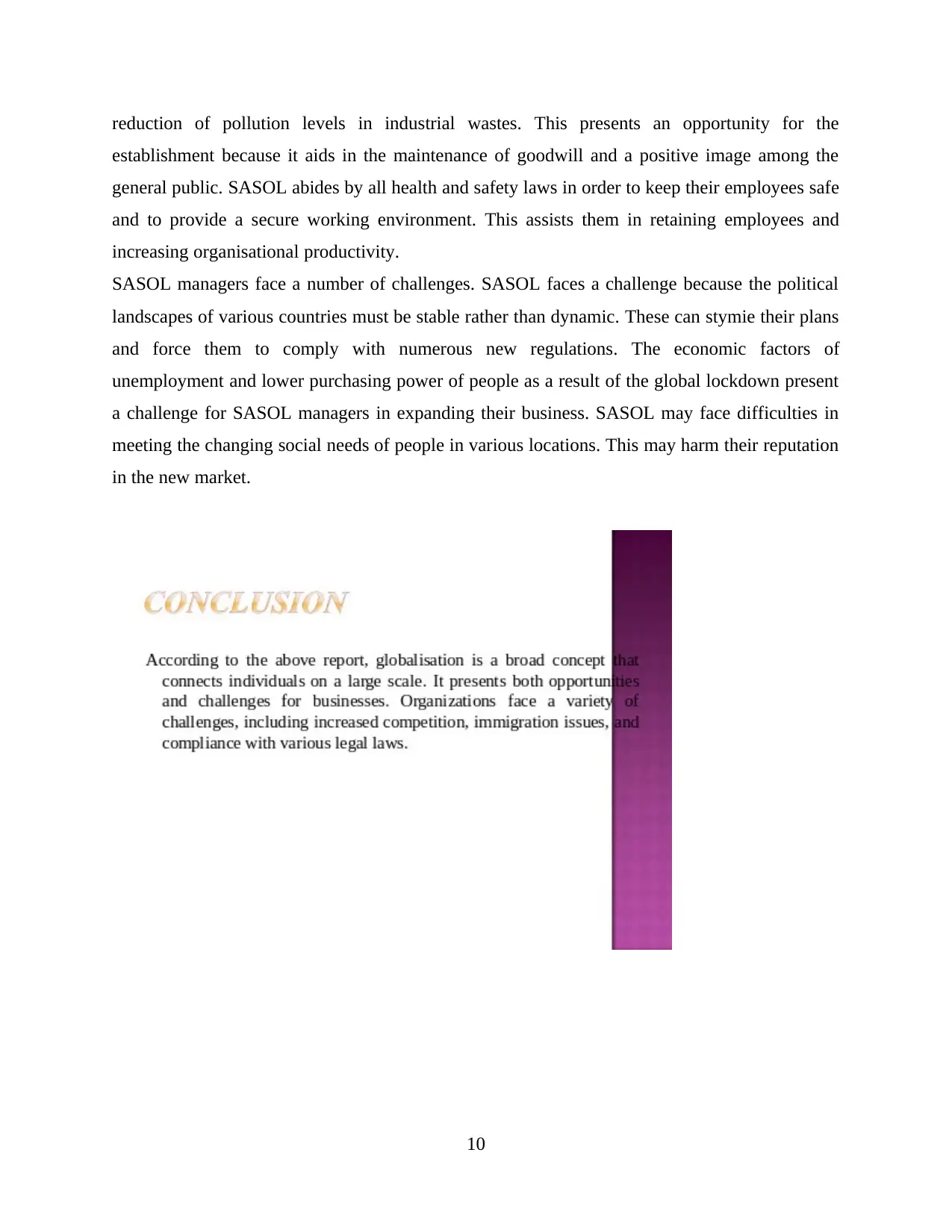
reduction of pollution levels in industrial wastes. This presents an opportunity for the
establishment because it aids in the maintenance of goodwill and a positive image among the
general public. SASOL abides by all health and safety laws in order to keep their employees safe
and to provide a secure working environment. This assists them in retaining employees and
increasing organisational productivity.
SASOL managers face a number of challenges. SASOL faces a challenge because the political
landscapes of various countries must be stable rather than dynamic. These can stymie their plans
and force them to comply with numerous new regulations. The economic factors of
unemployment and lower purchasing power of people as a result of the global lockdown present
a challenge for SASOL managers in expanding their business. SASOL may face difficulties in
meeting the changing social needs of people in various locations. This may harm their reputation
in the new market.
10
establishment because it aids in the maintenance of goodwill and a positive image among the
general public. SASOL abides by all health and safety laws in order to keep their employees safe
and to provide a secure working environment. This assists them in retaining employees and
increasing organisational productivity.
SASOL managers face a number of challenges. SASOL faces a challenge because the political
landscapes of various countries must be stable rather than dynamic. These can stymie their plans
and force them to comply with numerous new regulations. The economic factors of
unemployment and lower purchasing power of people as a result of the global lockdown present
a challenge for SASOL managers in expanding their business. SASOL may face difficulties in
meeting the changing social needs of people in various locations. This may harm their reputation
in the new market.
10
⊘ This is a preview!⊘
Do you want full access?
Subscribe today to unlock all pages.

Trusted by 1+ million students worldwide
1 out of 23
Related Documents
Your All-in-One AI-Powered Toolkit for Academic Success.
+13062052269
info@desklib.com
Available 24*7 on WhatsApp / Email
![[object Object]](/_next/static/media/star-bottom.7253800d.svg)
Unlock your academic potential
Copyright © 2020–2026 A2Z Services. All Rights Reserved. Developed and managed by ZUCOL.

